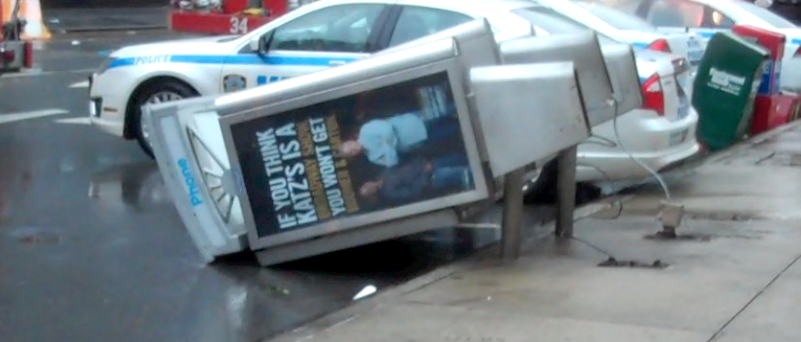MPR Authored
Such a Deal
November 15, 2012 You may have considered taking part in a “daily deal” program to increase sales at your small business. As always, you want to do your homework before jumping in. Lucky for you Constant Contact just published a post where they share information they gleaned as to “how and why” people use daily deals.
You may have considered taking part in a “daily deal” program to increase sales at your small business. As always, you want to do your homework before jumping in. Lucky for you Constant Contact just published a post where they share information they gleaned as to “how and why” people use daily deals.
The research firm Chadwick Martin Bailey sent out a survey on behalf of Constant Contact asking 1,433 consumers over the age of 18 and came up with some pretty interesting results:
- Consumers who sign up to receive daily deals end up purchasing them
- Recommendations from friends make consumers more likely to purchase a deal from an unfamiliar small business
- Personal endorsements drive deal purchases, especially for women
- People are willing to share a deal if it’s great, regardless of whether they are a customer
- More than 1/3 of consumers are more likely to buy a deal from a local small business
- For nearly 60% of customers, even a good deal experience doesn’t automatically equal loyalty
- More than twice as many consumers share deals via email than on social networks
- Deals for restaurants and entertainment are the most commonly shared
- 92% of consumers think local deals are here to stay
- Consumers think deals help attract new customers to local businesses
A lot of this information isn’t new. For example, the fact that women are more likely to make a purchase based on a “personal endorsement.” However, it should be noted that not too long ago that endorsement didn’t need to be “personal.” According to some statistics, an online recommendation from an unknown consumer was trusted by 70% of online consumers. However, what is of real interest to small business is the fact that this survey indicates at least one-third of those seeking online “daily deals” are more likely to buy something from an equally local small business (i.e. your small business.)
On the “not so great” side of the coin is knowing participating in daily deals isn’t a sure fire way to inspire customer loyalty. Again, this isn’t surprising. Think about it. Consumers who use daily deals are consumers who buy based on price. More than that, the fact that 60% state a daily deal doesn’t inspire loyalty indicates that it is likely that this 60% are consumers that always buy solely based on price. This means the minute your price isn’t the lowest they will skip town in a heartbeat. On the other hand, all is not lost. There’s that other 40% of daily dealers you should be following up on in ways that DO create customer loyalty. So daily deals do, in fact, provide an opportunity to create repeat business.
However, perhaps the most significant finding from this survey is that almost 100% of the people who sign up to receive daily deals purchase daily deals. Wouldn’t it be great if 92% of those you just sent emails translated into buying customers? This is a phenomenal statistic. Again, you can’t count on someone buying based on price to be loyal, but a mechanism this motivating to consumers represents an avenue to market to those who may otherwise not consider your local small business when making their buying decision.
Guest Authored
– Merchant Processing Resource
https://debanked.com
Betting on the Future With Merchant Cash Advance
November 14, 2012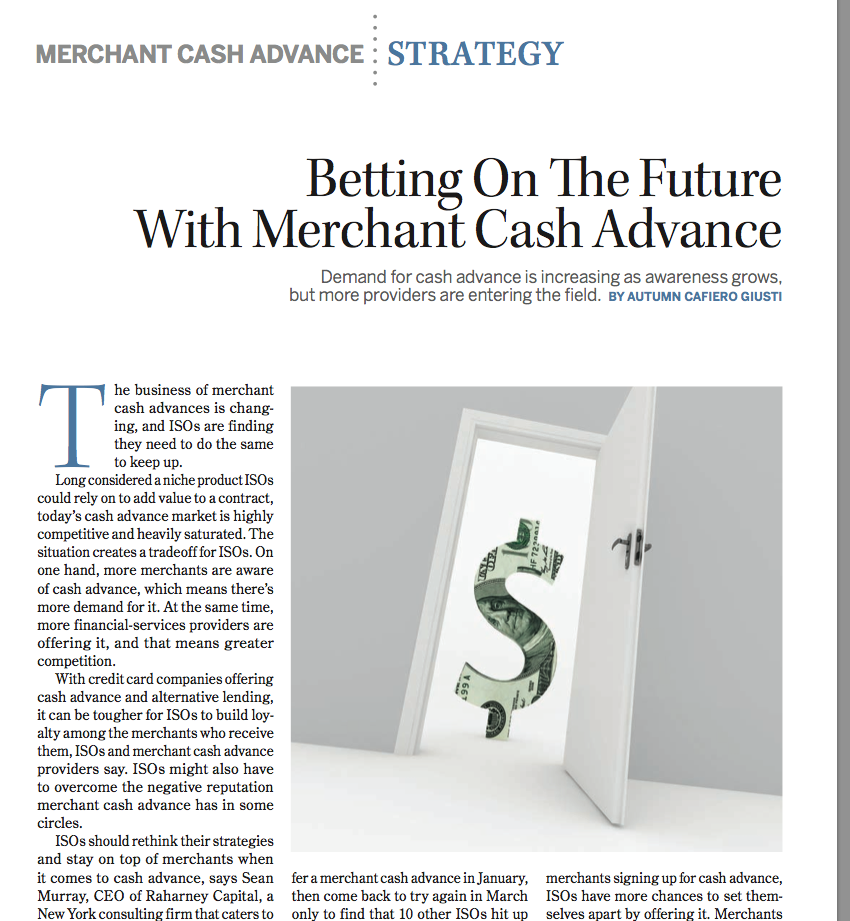 An excerpt of the article in ISO&Agent’s November/December 2012 Issue:
An excerpt of the article in ISO&Agent’s November/December 2012 Issue:
“The business of merchant cash advances is changing, and ISOs are finding they need to do the same to keep up.
Long considered a niche product ISOs could rely on to add value to a contract, today’s cash advance market is highly competitive and heavily saturated. The situation creates a tradeoff for ISOs. On one hand, more merchants are aware of cash advance, which means there’s more demand for it. At the same time, more financial services providers are offering it, and that means greater competition.
With credit card companies offering cash advance and alternative lending, it can be tougher for ISOs to build loyalty among the merchants who receive them, ISOs and merchant cash advance providers say. ISOs might also have to overcome the negative reputation merchant cash advance has in some circles.
ISOs should rethink their strategies and stay on top of merchants when it comes to cash advance, says Sean Murray, CEO of Raharney Capital, a New York consulting firm that caters to merchant cash advance companies. “You know the saying, ‘Always be closing?’ Well, you should always be offering merchant cash advance,” he says.
It’s not uncommon for an agent to offer a merchant cash advance in January, then come back to try again in March only to find that 10 other ISOs hit up the merchant in February, Murray says. “You can’t just throw it in there casually every few months. Everyone is marketing cash advance,” he says.
But opportunities arise…”
Read the full article in the November/December magazine available on the site.
It requires you sign up for a FREE subscription
Is Print Media Dead? Why Small Business Owners Should Take a Second Look
November 11, 2012 Many small business owners may have thrown out the newspaper with the bath water when it comes to using print media as a marketing and promotion channel for their small business. Number one, most of us are pretty much convinced that print media is dead. Major newspapers that have been around for eons are dead or dying. Print magazines are failing or subscriptions are woefully down. On top of that there are literally hundreds of thousands of online social media specialists and bloggers out there tooting the digital horn not as “the way of the future” – but telling us that the future is now. Any small business owner out there not engaging in social media marketing isn’t only missing the boat, they’re on a sinking ship.
Many small business owners may have thrown out the newspaper with the bath water when it comes to using print media as a marketing and promotion channel for their small business. Number one, most of us are pretty much convinced that print media is dead. Major newspapers that have been around for eons are dead or dying. Print magazines are failing or subscriptions are woefully down. On top of that there are literally hundreds of thousands of online social media specialists and bloggers out there tooting the digital horn not as “the way of the future” – but telling us that the future is now. Any small business owner out there not engaging in social media marketing isn’t only missing the boat, they’re on a sinking ship.
However, small business owners might want to take a second, and much closer, look at whether or not investing in print media still represents an opportunity to achieve a high rate of return for their particular business.
Print Media Can Hit Your Target
The most obvious example is a small local business owner. A business owner who serves a local community with distinct boundaries is targeting consumers and clients within that local jurisdiction. That local community may be at the neighborhood, small town, or even large municipal area. What is common to all local businesses is that oftentimes print media exists that provides a relatively low cost vehicle to promote their small business.
For example, small business owners in small towns are likely to get a pretty big bang for their buck promoting their business in their local small town newspaper. Many of these small town papers provide what could be classified as “hard journalism” reporting on local political and other town issues such as city budget and the like. However, a major focus in small town newspapers tends to be human interest articles that attract local readers. In turn, those articles attract specific types of readers.
For instance, often there will be a column dedicated to subjects such as gardening, cooking, local events, the environmental, the arts, books, and so on. Because the paper is so small, many local newspapers provide a greater opportunity to locate your ad near copy that relates to your small business, or that is read by people you’ve targeted as your most optimal customers or clients. If you’re a local hardware store, an ad located near the gardening article can be very effective. If you’re a local podiatrist or retail store selling running shoes, an ad near an article about a local 10K is a great opportunity. Most neighborhood and municipal newspapers offer this type or similar opportunities for ad placement.
Loyalty and Numbers Matter
Regarding reach of your small businesses’ ad, local print media can be a better option than promoting your local small business online. For one, many of these publications already have a very loyal readership. Any small business owner with even a modicum of experience creating an online presence can appreciate just how much effort, time, and (yes) money goes into creating a strong, loyal, and large following online. While social media is low cost, it isn’t “no cost.” Even if you’re not outsourcing social media activities (i.e. content creation, posting, replying, etc.) – you are paying a huge premium in time.
Equally important is that print advertising in many ways isn’t as limited as social media. You can get a whole lot more information in an ad in your local newspaper than an online banner ad. Additionally, advertising in your printed local publication can actually create more credibility for your small business. Consumers understand that print advertising comes at a cost and tend to assign credibility to businesses using print advertising. Consumers are savvy and know online banner ads can come pretty cheap – a print ad can effectively communicate your small business is both established and reliable.
Ironically, we’re going to provide you with the best argument for taking a second look at promoting and marketing your small business using print media with an online example. On their “About” page here is how one community paper describes themselves:
The College Park Community Paper has been in circulation since 1989. We are a monthly, full color, family friendly newspaper delivering the good news happening in College Park each month. The paper is delivered free of charge by mail to over 7,000 homes and businesses in the 32804 zip code which includes College Park and the Country Club of Orlando. Additional distribution is provided throughout the community and commercial district through the use of newspaper stands and counter top display. Additional exposure is garnered through our website which includes additional material not shown in the print edition.
You’ll also want to take a look at their ad rates here, but we use them as an example for quite another reason: they provide an excellent example of a small business integrating both on and offline channels to promote their small business, which can be not only a balanced approach, but an approach that provides the biggest bang for your buck.
– Merchant Processing Resource
https://debanked.com
Forward?
November 8, 2012The election is over and now it seems we will be “Moving forward, not back.” The republicans that have already come to accept Romney’s defeat are sounding a lot like Sookie Stackhouse:
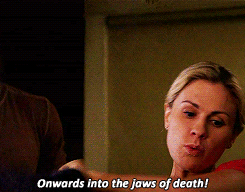
Onwards we go to help the little guy, a process many feel can’t happen until we end trickle-down economics. It’s the trickle part that doesn’t sound good. Money should flow freely gosh darn it, not trickle! We couldn’t agree more. Here’s a broad diagram of the economy at work:
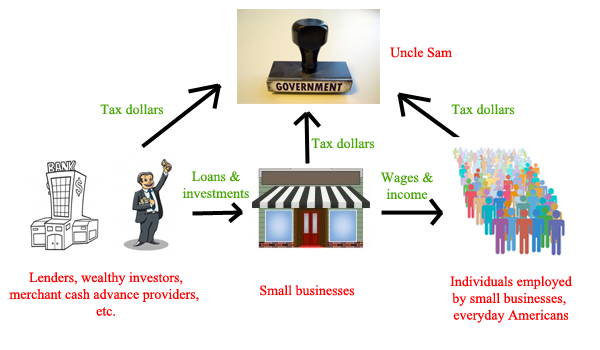
It’s popular to hate Wall Street, but Wall Street provides small businesses with financing to expand, who in turn employ more people in the process. Wall Street is not just banks and Merchant Cash Advance companies. It is any party that has enough money to invest in others while being able to absorb potential losses. A private investor is Wall Street. Wealthy friends or family members are Wall Street.
Tax these parties more and there is less money to invest in small businesses which means fewer businesses will receive capital to expand and hire. Wall Street will make less money as a result of less money being invested and therefore tax revenue will decrease. With fewer businesses hiring, less people will be employed and therefore less people will be paying taxes. Taxing Wall Street more does not necessarily mean more net tax dollars.
This Darn Trickle
One can dislike the economic chain since the flow of money between parties may not happen perfectly or because it allows Wall Street to get richer. There is nothing wrong with the rich getting richer, so long as the middle class and poor get richer too. If small businesses use the money invested by Wall Street wisely, they too will eventually become Wall Street. The amount of new jobs created as a result of a small business’s success means more wage earners will have a shot at becoming small businesses. In economics, a wide divide between rich and poor can be positive, for it creates a ladder that anyone can climb with no cap.
Empower the Little Guy
There is a competing theory and that is to believe that the economic chain starts with middle class wage earners. One could argue to significantly lower taxes on the middle class and the poor and impose much higher taxes on the rich. By doing so, consumers would have more money to spend at small businesses, prompting those small businesses to draw up plans to expand. That expansion capital still needs to come from somewhere and less of it will be there if Wall Street has been further taxed. Perhaps a small business could save money for a few years and use their savings to self-finance their own expansion. Under this theory, everyone becomes part of a very broad middle class. The extremes disappear.
Whoops
When the extremes disappear, there will be few investors with the capability to make large investments or investments that are particularly risky. A small business owner could save up for several years and open a 2nd location without an investment, but could he open 200 nationwide? Not without Wall Street. How many jobs will be created by the opening of 1 store? How many would be created by the opening of 200?
Now calculate how much new tax revenue is generated in each scenario, as well as the number of people that move up from being poor and unemployed to middle class and employed.
When the rich aren’t getting richer, the other classes can’t really move up either. Everyone stays in a broad middle class and innovation and advancements decline. The consumer or small business owner with a potential $100 million innovative idea won’t be able to raise the capital to see it through. How can they when the rich have been prevented from becoming really rich? What if they had a $10 billion idea?
One could argue as a single class society, that a $100 million idea or $10 billion idea could be financed by the government. This is true. It is also textbook state socialism. A one class society is also the premise of Marxism, where everyone is getting their needs met through cooperative work.
Marxism ignores the realities of a global economy. Ultimately, Americans need to obtain resources from other nations, and stay ahead technologically so as not to be conquered by outside forces. A classless society is a stale society, with no economic movement, social movement, or technological advancements.
How will the Merchant Cash Advance Market be Affected?
Merchant Cash Advance companies typically invest in businesses with less than 50 employees. Under Obamacare, any business with less than 50 employees does NOT HAVE to provide health insurance. This program may not affect the business as a whole, but the law mandates that all individuals purchase health insurance for themselves if they don’t have coverage already. Small business owners in the MCA market may be incrementally stressed by having to purchase health insurance. Their employees will be further stressed by having to buy it as well. As a result, wages may need to go up to help workers pay for their own insurance and less money will be available to grow and hire.
The total public debt outstanding has exceeded $16 trillion. That debt has to be paid for somehow and it is more likely than ever that Wall Street is going to have to pay up. This will not stimulate growth and as such, the economy is not likely to pick up any time soon.
Traditional lenders are going to remain quiet while the alternative lenders are going to power through it. A business could save up for three years and open a 2nd location or it could open it today with a Merchant Cash Advance. In three years, the location they want may no longer be available and that individual looking for a job will have run out of unemployment benefits long ago.
A Merchant Cash Advance helps small businesses expand today, hire today, generate more tax revenue for the government today, and helps everyone move up the economic ladder. Baby steps are better than none at all. What starts with a 2nd location may lead to a dream of owning 200 locations nationwide. They’ll need a bigger fish than MCA to get there. Let’s make sure we don’t tax those fish to death.

What do you think Michael?

Forward!
– Merchant Processing Resource
https://debanked.com
Best Tip EVER to Start Your Business
November 5, 2012Our website offers lots of advice on operating a business, merchant cash advance, and merchant processing, but nothing matches the wisdom we gained when we encountered this sign. Starting your business? Here is a great tip to ensure its a success!
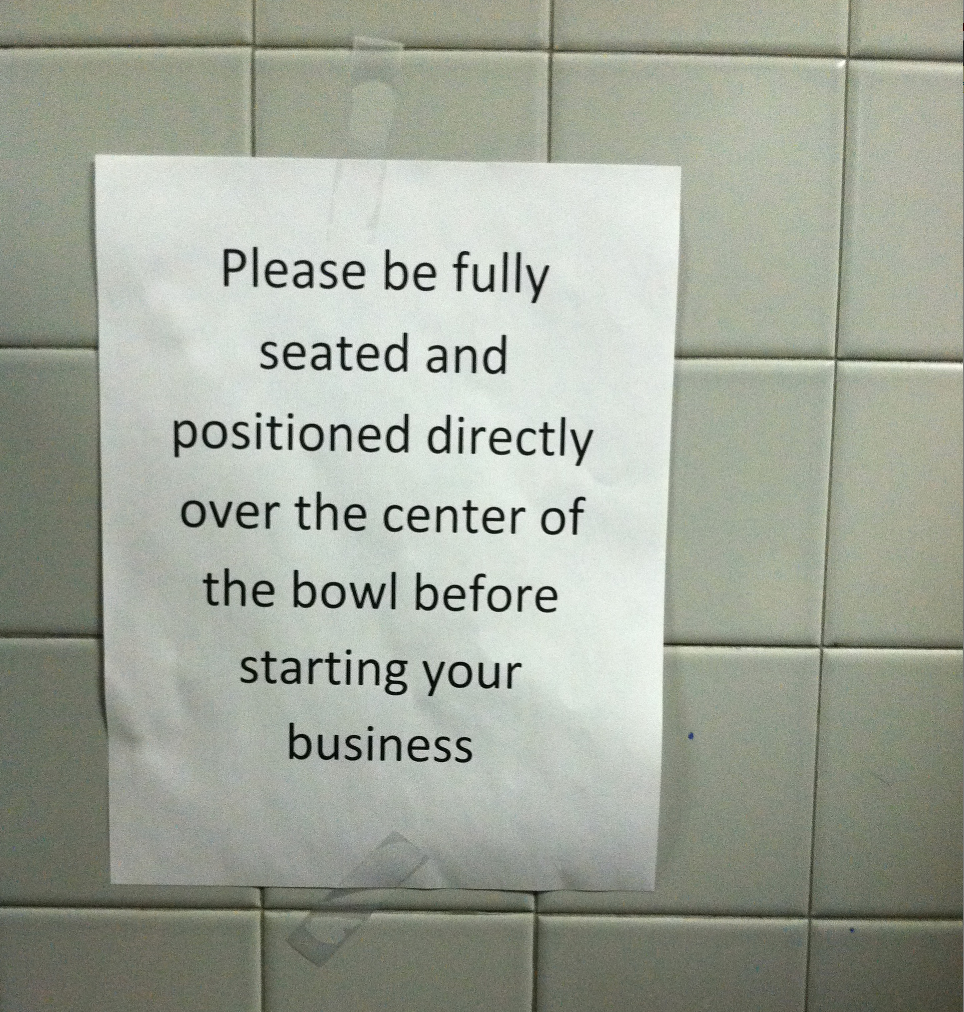
Is There a Majority of Small Business Owners Ready to Vote for One Presidential Candidate?
November 3, 2012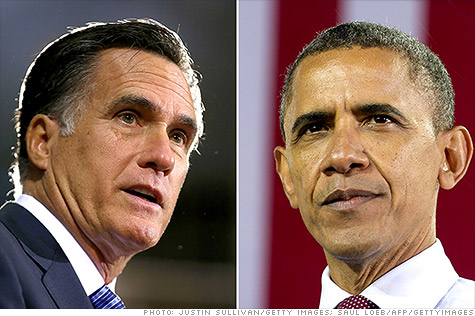 For the “everyday” small business owner, trying to figure out which presidential candidate most small business owners support, or even if one candidate has more support from the business community over the other, can be a fruitless endeavor.
For the “everyday” small business owner, trying to figure out which presidential candidate most small business owners support, or even if one candidate has more support from the business community over the other, can be a fruitless endeavor.
While we may not be able to come up with an inarguable percentage, going on a Google safari does provide us with food for thought.
While their statistics may not completely represent the small business as a whole due to the fact that they’re a membership organization and therefore might be “preaching to the choir”, the National Federation posts some interesting statistics on their home page. For instance:
- According to a November 2010 member ballot, 93% of NFIB members supported repealing the healthcare law.
- 78% of NFIB members supported a moratorium on new regulations that cost more than $100 million.
- According to the latest NFIB member ballot, 90% of small business owners support a balanced budget amendment to the Constitution.
- The cost of fuel ranks as the third-most important problem facing small business owners. Electricity costs rank 12th.
- 91% of NFIB members said that Congress should permanently increase the dollar amount of equipment purchases a small business can expense.
- According to a recent NFIB ballot, unreasonable government regulations rank as the fifth-most important concern facing small business.
The page is formatted in three columns, with the statistics in the middle and a description of Romney’s and Obama’s positions on either side. Follow this link to NFIB where you can draw your own conclusions.
On the other hand, we’ve got the Small Business Majority another membership organization, who report the following statistics based on their research and surveys:
- Only a third of small business owners want the Supreme Court to overturn the Affordable Care Act; a plurality of 50% would like it upheld, with minor or no changes.
- 50% of small business owners support clean energy and climate legislation.
- Small business owners see regulations as a necessary part of a modern economy and believe they can live with them if they’re fair and reasonable: 86% of small business owners agree some regulation of business is necessary for a modern economy, and 93% of them agree their business can live with some regulation if it is fair, manageable and reasonable.
- The majority of small businesses support raising taxes on high-income earners; nearly 9 in 10 oppose raising taxes on the middle class: Small business owners recognize the gravity of our budget crisis: 52% agree that while no one likes to raise taxes, we should raise taxes on the wealthiest 2%.
The above statistics are pulled from a variety of reports that can be easily located on the Small Business Majority website. However, it’s likely you can see where we’re going with this comparison of statistics provided by these two organizations, it is difficult, if not impossible, to accurately assess who the majority of American small business owners are likely to vote for. The NFIB endorses candidates in both federal and state elections, but does not provide an endorsement for either Obama or Romney. The Small Business Majority does not appear to provide endorsements of political candidates. However, it is worth a visit to both sites to make your own personal determination as to whether any potential bias exists.
Guest Authored
– Merchant Processing Resource
https://debanked.com
Can a Broken Window Be a Good Thing?
November 2, 2012 There’s a ton of controversy right now as to whether or not the devastation caused by Hurricane Sandy will, or will not, serve to stimulate the economy.
There’s a ton of controversy right now as to whether or not the devastation caused by Hurricane Sandy will, or will not, serve to stimulate the economy.
Obviously there are two camps: one says Sandy is stimulating and the other days it isn’t. It would appear that the only thing we can be sure Sandy is stimulating is controversy over whether or not it will serve as a boon to what many see as our nation’s less-than stellar economic recovery (at least in the areas devastated by the storm.)
But this debate isn’t limited to people duking it out on Facebook using terms such as “jerk” and “idiot” to prove their point (otherwise known as an ad hominem, or “against the man” argument that confuses name calling with intelligent debate.) We’ve got some serious academic economic theory out on the table.
On one hand you’ve got your Keynesians (20th century economist John Maynard Keynes gave us the theory.) Keynesians were/are considered “revolutionary” in that they deny the ability of a free economy to “fix” or stabilize itself and instead feel that, in order for an economy to consistently support full employment and stable prices government must implement policies that stabilize prices and create full employment scenarios.
On the other hand you’ve got economists who support a “laissez-faire” economy. (18th century economist Adam Smith provided us with this theory.) Adams and his adherents felt that since human beings are guided by self-interest as long as you leave the economy alone (i.e. no government intervention) the result will be a balanced, self-regulating economy because that is the state of economy that best serves self interest.
And then we’ve got Frédéric Bastiat. Ironically he happens to be a great defender of laissez-faire economics. We say ironic as it is his “Parable of the Broken Window” that tells us that, in fact, destruction, whether it be caused by natural forces (such as Hurricane Sandy) or man (such as wars) do not stimulate the economy by creating more business (and therefore more jobs.) Bastiat included the story in an essay entitled “The Seen and the Unseen.” Here’s the short version of the parable:
The Seen: A boy breaks a store window. The owner now pays for a new window, which creates income for the glazier.
The Unseen: Because the store owner has to fix his (or her) window, he (or she) now doesn’t have money to invest in the growth of their business – or for anything else they might have spent it on.
In other words, Bastiat’s theory is that destruction doesn’t create more income, it simply reallocates income. Obviously, if this is true, disasters that cause mass destruction don’t stimulate the economy.
As far as the battle between laissez-faire and Keynesian economists are concerned, for our purposes let’s just say the jury is still out, especially after suffering through this last (or current depending on who you listen to) economic debacle. On the one hand, Keynesians can gloat over seemingly infinite corporate greed that resulted in lost homes as well as lost jobs – on the other hand, those who live on the laissez-faire side of the street can gleefully cite how President Obama’s stimulus package perhaps did nothing more than (as Bastiat might say) help us see that the economy was “worse than we realized.”

Back to Bastiat
Whether or not laissez-faire or Keynesian policy should be pursued in the effort to cure the economy really isn’t the point as related to the impact of Hurricane Sandy – at least for the purpose of this article. What is at hand is whether or not Bastiat was right. However, perhaps we’ve left out an important economic theory. And that would be Darwinian, or “evolutionary economics.”
There is no getting around the fact that evolutionary economics is pretty darn complex. Evolutionary economists like to use a lot of math – especially something called game theory which uses math to explain/describe what might appear to be “irrational” economic choices or events.
However, one thing we can all understand is that evolutionary economics uses methods and ideas similar to those used to study biological evolution. And most of us are very familiar with the evolutionary concept of “survival of the fittest.”
Just for a minute let’s suppose that two store owners find that someone broke their window (destruction.)
The Seen: Both hire a glazier to fix their window (and we see the glazier benefit.)
The Unseen Store Owner #1: Poor guy (or gal) is forced to use money previously identified to be used to pay for an ad in the local newspaper to promote an upcoming sale. Now that the cash is gone, the store owner responds by throwing up their hands in despair.
The Unseen Store Owner #2: Decides to take President Theodore “Teddy” Roosevelt’s advice and “Do the best I can, with what I’ve got, where I’m at.” Knowing the ad is now out of the question, and without any funds left to promote the upcoming sale, she (or he) decides to use the new window to showcase the sale.
The store owner pulls out every old decoration from every holiday or special event sale from the back room and decorates the new, clear as a bell storefront window. She (or he) then gets on Facebook and Twitter and announces a contest to come up with a name for a sale that encompasses every holiday and special event known to man. The contest winner will receive $200 to donate to their favorite community charity. She (or he) contacts every existing customer via email to inform them of the upcoming sale and contest and asks them to spread the word.
The local community newspaper (ironically the one that the paid ad would have run in) picks up the story. The sale is a huge success. Too many people assume that “fittest” always means strongest. Wrong. “Fit” means the organism that is best able to adapt when the environment changes.
Obviously Store Owner #2 fits that bill. The moral is that, no matter what the “disaster”, be it hurricane or recession, crossing your fingers and hoping for the best or hoping the government will save you are not your only two choices. One choice will always be yours to make, and that is choosing to do the best you can, with what you’ve got, where you’re at.
Guest Author
– Merchant Processing Resource
https://debanked.com
Sandy
October 30, 2012deBanked’s office was empty on Monday and early Tuesday morning due to Hurricane Sandy. Instead, we were out dealing with the reality of having no power or water for at least a week. We did survey some damage in east midtown Manhattan, an area where floods exceeded over 5 feet last night on 36th street, completely submerging cars. Floods subsided by morning.
One quote that got us through the night’s harrowing ordeal was a facebook update from Seth Broman, Merchant Cash and Capital’s VP of Business Development:
Dear friends and family, if this is the last communication I have for days with battery % approaching single digits, please make sure that all my rosters are properly updated for the bye weeks, proper waiver moves are processed, I vote against every trade except my own and I’d rather play without a kicker than drop Chicago’s D. Thanks, Seth
We hope everyone is safe. Did the storm affect you?





